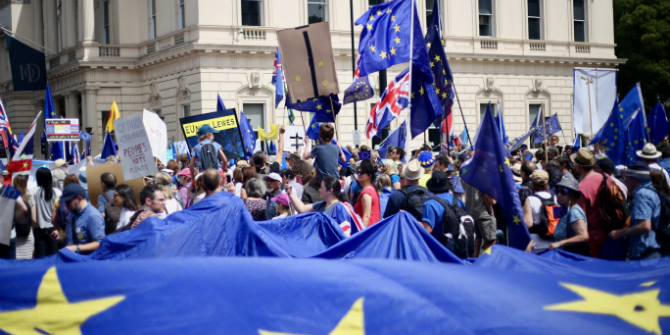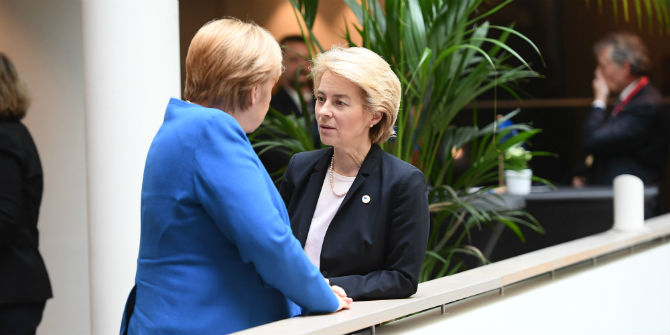

Many people believe that the UK’s decision to leave the EU spells trouble for both country and continent, yet by and large think that the exit vote and process, painful though they may be, adhere to the rules and spirit of democratic self-government. Peter Niesen and Markus Patberg argue that in one important respect this is not the case, since fully democratic credentials require reversibility in decision-making and are incompatible with an irreversible loss of political rights.
The notion of reversibility may sound treacherous, as it brings to mind a long-standing practice of repeated referendums on EU-related decisions in member states. Where votes ran counter to the goal of an ‘ever closer union’, governments have had their electorates repeat referendums, as in the case of the two Irish referendums on the Lisbon Treaty in 2008 and 2009. Pleas for reversibility seem to echo the questionable strategy of repeating EU referendums with negative results for as long as it takes for citizens to fall in line with Brussels diktat. We advocate neither a second referendum nor a stop to Brexit. The Brexit decision should be implemented, respecting the democratic decision by referendum and act of Parliament. However, for democratic reasons, we argue that the EU should keep the door open for a return of the UK by a unilateral decision of its people.
One reason for the significance of reversibility is that electorates change. A 52 percent majority of the electorate voted to leave the EU in the 2016 referendum. Already now, there is an imbalance resulting from the fact that the ‘leave’ vote was significantly higher among older voters than among younger voters. Important demographic changes have taken place since the referendum. Arguably, even if people have not changed their minds about Brexit, there is reason to think that the majorities will soon be reversed through natural causes. Another, even more significant reason is that people have a right to change their minds. Jean-Jacques Rousseau thought that, to the contrary, once the general will has been fixed, those in the minority should hasten to adopt the majority view, since they must have been wrong in the first place. Today, most democratic theorists reject this idea. They hold that persisting disagreement is productive, since democracy includes the right to learn from experience, to re-evaluate reasons and arguments, and to reassess issues in light of new information or changed circumstances.
The non-reversibility of exit decisions is a flaw in the institutional design of the EU polity – and it is a significant one because EU withdrawal implies that individuals lose political rights, many of them against their will. Where the will of the people is to become law, and the people cannot be ruled out to undergo a change of mind later on, the revised will of the people must be capable of becoming law as well. Yet, after Brexit, a majority decision with the opposite outcome will not bring the UK back into the EU. The UK may, of course, re-apply for membership, but its citizens will not have a definitive say in the outcome as they do now. They will be treated as petitioners, not co-sovereigns, no different from the nationals of first-time applicants like Turkey or Georgia. Government initiatives to re-apply, and likewise the EU negotiation position, may depend on tactical considerations, so that the people’s will toward an eventual re-entry will fail to be conclusive. To ensure reversibility of the Brexit decision, we recommend Article 50 of the Treaty on European Union (TEU) be amended to allow for the re-entry of former member states, by referendum or act of parliament, or, if this cannot be achieved, by providing an identical re-entry clause in the withdrawal agreement (if there be one).
The idea to match the right to unilateral exit from the EU with a unilateral option of re-entry may come as a surprise. Political philosophers criticizing Brexit as undemocratic attack Article 50 for its privileging of nation-state sovereignty. They believe that because the separation was decided unilaterally, it did not take sufficiently into account all those outside the UK who are and will be massively affected by Brexit. The thought is that where decisions have a huge influence on people’s life chances, those concerned should have a say in the decision. We think this view is too simple because it ignores the nature of the EU as a voluntary association. The argument confuses the free consensus to be and remain members of a federation of states with the coercive predicament of the regions and provinces of nation-states. Whereas regions or sub-state nations cannot unilaterally secede from (federal) states, federations of states can be entered into and left freely. The citizens of the EU member states, in contrast to the citizens of, say, the Free and Hanseatic City of Hamburg, as part of the Federal Republic of Germany, have not given up their right to full political self-determination. The democratic dilemma is that, under the current EU treaties, once a people have exercised its freedom to leave, they are not free to reverse their decision.
 Image licenced under CC BY-SA 4.0.
Image licenced under CC BY-SA 4.0.
In the remainder of this post, we want to sharpen our proposal by contrasting it with two rivalling suggestions. First, some authors have argued that the main problem of Brexit is that people will be losing their European civil rights such as freedom of movement, and that it is highly unusual to be stripped of one’s civil rights through a simple majority decision. The material rights at least of those unwilling to lose them should, therefore, be reinstated through an individual application process. This argument sounds attractive, not least since it would give European citizenship a meaningful role independently from nation-state citizenship. But there are several things that are wrong with it.
It is deeply asymmetric in benefitting some UK citizens without ensuring reciprocal openness for other EU citizens (the EU could try to negotiate such an arrangement, but this would obviously go against one of the major motivations of Brexit and render it almost meaningless). At the same time, it propels inequality in the UK since it privileges the interests of the ‘movers’ over those of the ‘stayers’ among British citizens. Finally, it addresses EU citizens as private beneficiaries rather than as members of a self-governing collective. It empowers border-crossing social and economic activities, but fails to address the problem of the loss of political rights.
A second idea is to continue the representation of British citizens in the European Parliament after the UK has left the EU. This scheme agrees with the first in that EU citizenship derives from member state citizenship, but need not completely cease with it. UK citizens would retain their political rights, but not necessarily their substantive European rights, i.e. their freedom of movement. This would ensure that the entire UK citizenry would be recognised impartially, in its Europhile as well as in its Eurosceptic segments. Continued representation in the EP would keep alive the possibility of a re-entry which could be campaigned and lobbied for, and do away with the inegalitarian consequences under a private remain scheme for European citizenship.
What counts in favour of this proposal is that it would put the horse before the cart: it would install political rights to potentially bring back rights to free movement, and not bring back rights without representation as under the first suggestion. A disadvantage of the idea is the institutional weakness of the European Parliament, which is only a co-legislative organ. While UK citizens’ ongoing representation would allow them to keep a foot in the door, a re-entry to the EU could not be brought about through this channel. In light of this, the price that EU citizens would have to pay seems too high: to allow UK citizens to continue to influence European legislation, although no longer being subject to it.
Our own idea agrees with the second suggestion in that it finds an irreversible loss of political rights intolerable. While Brexit may or may not be a good idea in its consequences, it is a sure sign of political regression to have one’s democratic options reduced. But it is wrong to devise ‘business as usual’ responses to the exit decision, or to try and hinder an electorate from ceding its European rights alongside its membership in the federation. True, at the nation-state level, we would insist that citizens cannot vote to exclude co-citizens (and themselves) from the rights to political self-determination. But Brexit is different in that UK citizens will not be generally disenfranchised, as they remain members of a nation-state democracy. Our suggestion, therefore, is to establish a privileged return route to renewed membership for former member states, in other words, to let the UK re-enter by a unilateral decision of its people, under the legal and financial conditions of the pre-Brexit status quo. The basis for this could be an amendment of Article 50 TEU or a provision in the withdrawal agreement. This would leave UK citizens disenfranchised from EU citizenship, but empowered to re-instate it after Brexit.
In conclusion, we take up two remaining objections. One objection is that such a clause, if provided for in the EU Treaty, could provide an incentive to opt in and out according to the necessities of the day, which would make polity stability impossible. However, given the huge ramifications of entry and exit, it seems highly unlikely that any citizenry would toy around with such an option. A temporary exit could not be used to cover for, e.g., a cheapening of domestic rule-of-law standards, since re-entry would presuppose constitutional continuity with European Union standards.
Another, more principled, objection is that the social and economic consequences of Brexit and similar opt-outs cannot simply be undone. Even if the UK were to re-join the EU under current legal and financial conditions, circumstances will have changed, and perhaps a state of disrepair would be hard to overcome. Even though a democratic society can get in and out of nuclear energy provision, nuclear waste will continue to radiate. But a right to bring back an ex ante state of the world is not part of our claim. We argue that political decisions and the revocation of legal statuses need to be reversible, not that a social, natural, or economic status quo would have to be preserved to return to.
The important reason in favour of a re-entry clause is that it would make EU withdrawal reversible. It would give the UK electorate the chance to reconsider their decision when and if they wish, and preserve to them the agency so highly prized in the referendum process. It would ensure that there would be no irrevocable loss of political rights, which would then be instrumental in bringing back material rights, although any such rights would have to remain inactive. Former EU citizens would not fall back to the status of third-country nationals but encounter current EU citizens as co-citizens ‘on stand-by’.
This post represents the views of the author(s) and neither those of the LSE Brexit blog nor of the LSE.
Peter Niesen and Markus Patberg are political theorists at Hamburg University and co-investigators of the DFG-funded project “Reclaiming Constituent Power? Emerging Counter-Narratives of EU Constitutionalisation”. Their text will appear in a volume with philosophical interventions on the European Union, edited by Marco Meyer.







At least the matter was decided by a democrat vote. We adopted the Maastritch Treaty with no vote at all and that ‘decision’ is now proving quite difficult to reverse.
@Teejay: ” We adopted the Maastritch Treaty with no vote at all”. Actually I think there was a vote, namely the General Election 1992. This happened after Maastricht had been negotiated and before it was ratified, so the UK electorate could have elected a government committed to abandoning Maastricht. None of the three major parties wanted to abandon Maastricht so it wasn’t discussed as much as, say, how green the shoots were, the War of Jennifer’s Ear, or the Natural Law Party’s demonstration of yogic flying. This is how parliamentary elections work, you don’t get to vote on individual issues, but choose between a small number of options which bundle a large number of issues. I don’t think that’s such a bad thing, because it forces people to prioritise what they think is important and what less important. The Maastricht treaty was not that important.
“This is how parliamentary elections work”
and itis why we occasionally need referendums and why we should respect the outcome.of any referendum.
Incidentally, in the 2015 General Election over 98% of the MPs were voted in on manifestos which supported ongoing membership of the EU even though the electorate (we now know) were evenly split on the issue. Unlike you, I think that is a bad thing.
Teejay, I think the fundamental question is whether democracy should reflect the will of the people in all issues, or whether this should be mediated by parliamentary representatives. I think the latter. For example, I think it was a good thing that capital punishment for murder was banned in the UK in the 1960s, even though I suspect a majority of the population back then thought it shouldn’t be banned. We don’t just elect representatives to do what we tell them to, but to think for themselves and apply their own moral judgment.
I don’t think you are quite right about the 2015 election. There, more than half the MPs were elected committed by their manifesto to support an in-out referendum. The rest you know …
“I think the fundamental question is whether democracy should reflect the will of the people in all issues, or whether this should be mediated by parliamentary representatives. ”
John Major forced the Maastricht treaty through Parliament only on a second vote having lost the first. In effect he preempted the views of our parliamentary representatives by making it a vote of no confidence.
QTeejay: “John Major forced the Maastricht treaty through Parliament only on a second vote having lost the first. In effect he preempted the views of our parliamentary representatives by making it a vote of no confidence.” No. He made the Maastricht rebels chose between Maastricht and fresh elections. That’s quite legitimate, in my opinion.
If you are complaining about parliamentary tactics you might also complain about the way Labour and Lib Dems, who supported Maastricht, voted against as a tactic to create difficulties for John Major. On the other hand, if you complain about parliamentary tactics while supporting the principle of parliamentary democracy (as I do) this is a bid like saying you like Christmas Pudding, but don’t like the plums.
In any case, the Maastricht rebels ran on the Conservative Manifesto, which backed Maastricht. John Major also made it clear before the General Election that he didn’t believe in referenda and wasn’t going to put Maastricht to a referendum, if I recall correctly. So I think John Major was entitled to push Maastricht through.
Alias,
You obviously have a different view of democracy to me. At the last election, I wrote ‘none of these’ on the ballot paper. Sadly, it was recorded as a spoilt vote which it clearly wasn’t, it was a clear expression of my viewpoint.
I have mostly voted ‘none of these’ in recent elections. The exception was in 2015 when I voted Labour. I thought Milliband was a plonker but I wished to vote against holding a referendum on EU membership. It was self evidently a stupid thing to do when the country was so obviously split on the issue.
A well presented article that the EU wuold do well to include in the rules.
With this in mind the Eu seem then to be fairyl philanthropic in its thinking. At the moment it is being versatorial in not advocating a border of technology in the island of “Ireland” This in spite of contiuing to bab an open border.
The UK population chose sovereignly to leave whatever their available information about EU. They may realize that it was a mistake. In that case they will have to take a further decision, coming back in or staying out of the EU. For each decision, there are consequences to be supported, loss of rights and creation of new ones.
Why are the people of UK entitled to do whatever they want with EU when they are refusing in the same to be held by their obligations ?
They refuse Freedom of movement, they want no ECJ, they want to trade independently. So be it.
Nobody in the EU ever prevented UK businesses from trading with foreign nations, nobody prevented the UK government from applying tightful limits to Freedom of Movement…
UK policy toward EU is characterized by blinking/switching positions
Suppose in 20 years the UK wants to reverse Brexit. Then there will be a huge number of areas where either the UK, or the EU, have diverged, where it will be necessary to negotiate accession. (The EU budget is an obvious example, but there are numerous other things, like fishing quotas or numbers of MEPs, which get divided up among member states) I don’t believe it would be feasible for the Prime Minster to just send a letter and get the status quo ante. And if not that, what?
Why should the EU 27 accept a right to a unilateral Brexit reversal? They will also want the right to say No. (Or Non, Nie or Nein.)
Thanks, that’s a real problem. In taking up the two objections at the end of our post, we argue that a right of return presupposes stability of legal and financial conditions. So an eventual return to the EU would not necessitate the UK’s membership in the common currency, for example, even if all new applicants would have to accept it. In the same way, if a former member state has taken an autocratic turn in the meantime, or introduced capital punishment, they should not be able to trigger the return right as long as their constitution has undergone non-trivial changes with regard to democratic autonomy and the rule of law. But yes, state and EU legislation will in the meantime have to adopt to the challenges of the day, such that some negotiation over the conditions of re-joining will become necessary. On your second point, our claim is that the EU 27 governments should not have a say in the question of an eventual return, unlike in the case of a first-time accession, since the re-activation of European citizenship should have priority over intergovernmental veto power.
You are talking about an organisation which makes a disruptive move to Strasbourg every 4 weeks because of a shabby deal made over 50 years ago. The French won’t give up on the Strasbourg Parliament and they would veto anything which made it easier for the UK to rejoin the EU. You are wasting your time to suggest this.
This is a very good point. I am advocating for a unilateral re-entry clause in the withdrawal agreement which can be exercised prior to the end of the implementation period. This would mean the U.K. would still be aligned with EU. I think after a prolonged period it would not be possible to rejoin without the agreement of other member states.
“While Brexit may or may not be a good idea in its consequences, it is a sure sign of political regression to have one’s democratic options reduced.”
Such rights as being asked whether to become part of a supra-national group which can over-rule and dictate to a democratically elected government, when the people who elected that government have no direct say in the appointment of personnel to the supra-national group? THAT is political regression and having one’s democratic options reduced.
@ alias.
you have a very large crystal ball if you think the EU will exist in 20 years time.
“you have a very large crystal ball if you think the EU will exist in 20 years time” I think it might, I don’t know that it will.
@Peter: “some negotiation over the conditions of re-joining will become necessary” Peter, I think you’ve just conceded the whole point. If there is negotiation, it follows that whoever is doing the negotiating on the EU side will have the right to say no.
Nearly left, and talk of rejoining. Such assumptions. Give it 5-10years of watching the eu crumble from outside, not many would wish to rejoin. You assume another referendum in a while will be passed to rejoin?
-assumption- the mother of all fur cups.